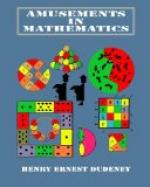“But, Mr. Filkins,” said little Willie Allgood, “why could not the millionth man have, say, ten thousand hairs and a half?”
“That is mere hair-splitting, Willie, and does not come into the question.”
“Here is a curious paradox,” said George. “If a thousand soldiers are drawn up in battle array on a plane”—they understood him to mean “plain”—“only one man will stand upright.”
Nobody could see why. But George explained that, according to Euclid, a plane can touch a sphere only at one point, and that person only who stands at that point, with respect to the centre of the earth, will stand upright.
“In the same way,” he remarked, “if a billiard-table were quite level—that is, a perfect plane—the balls ought to roll to the centre.”
Though he tried to explain this by placing a visiting-card on an orange and expounding the law of gravitation, Mrs. Allgood declined to accept the statement. She could not see that the top of a true billiard-table must, theoretically, be spherical, just like a portion of the orange-peel that George cut out. Of course, the table is so small in proportion to the surface of the earth that the curvature is not appreciable, but it is nevertheless true in theory. A surface that we call level is not the same as our idea of a true geometrical plane.
“Uncle John,” broke in Willie Allgood, “there is a certain island situated between England and France, and yet that island is farther from France than England is. What is the island?”
“That seems absurd, my boy; because if I place this tumbler, to represent the island, between these two plates, it seems impossible that the tumbler can be farther from either of the plates than they are from each other.”
“But isn’t Guernsey between England and France?” asked Willie.
“Yes, certainly.”
“Well, then, I think you will find, uncle, that Guernsey is about twenty-six miles from France, and England is only twenty-one miles from France, between Calais and Dover.”
“My mathematical master,” said George, “has been trying to induce me to accept the axiom that ’if equals be multiplied by equals the products are equal.’”
“It is self-evident,” pointed out Mr. Filkins. “For example, if 3 feet equal 1 yard, then twice 3 feet will equal 2 yards. Do you see?”
“But, Mr. Filkins,” asked George, “is this tumbler half full of water equal to a similar glass half empty?”
“Certainly, George.”
“Then it follows from the axiom that a glass full must equal a glass empty. Is that correct?”
“No, clearly not. I never thought of it in that light.”
“Perhaps,” suggested Mr. Allgood, “the rule does not apply to liquids.”
“Just what I was thinking, Allgood. It would seem that we must make an exception in the case of liquids.”
“But it would be awkward,” said George, with a smile, “if we also had to except the case of solids. For instance, let us take the solid earth. One mile square equals one square mile. Therefore two miles square must equal two square miles. Is this so?”




